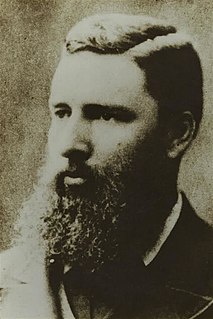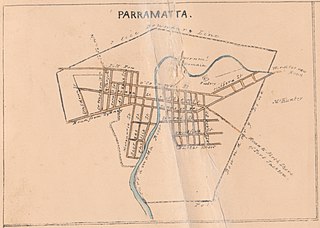Related Research Articles

David Watkins was an Australian politician. He was an Australian Labor Party member of the New South Wales Legislative Assembly for Wallsend from 1894 until 1901. At Federation, he was elected to the new Australian House of Representatives as the Labor member for Newcastle and served until his death in 1935. Watkins' death left former Prime Minister Billy Hughes as the only remaining member of the First Parliament still in the House.
Cumberland was an electoral district of the Legislative Assembly in the Australian state of New South Wales from 1856 to 1859, in the rural part of Cumberland County, which includes Sydney. It included all of the county south of Parramatta Road and the Great Western Highway, except for the urban electorates of Sydney (City), Sydney Hamlets, Parramatta and Cumberland Boroughs, which included Liverpool and Campbelltown. It elected two members simultaneously, with voters casting two votes and the first two candidates being elected.
Members of the New South Wales Legislative Assembly who served in the seventh parliament of New South Wales held their seats from 1872 to 1874.</ref> The 182 election was held between 13 February and 28 March 1872 with parliament first meeting on 30 April 1872. There were 72 members elected for 52 single member electorates, 6 two member electorates and 2 four member electorates. The maximum term of this parliament was 3 years. However the assembly was dissolved after 32 months. Henry Parkes was the premier for the duration of the parliament. The Speaker was William Arnold.
Members of the New South Wales Legislative Assembly who served in the eighth parliament of New South Wales held their seats from 1874 to 1877.</ref> The 1874–75 election was held between 8 December 1874 and 12 January 1875 with parliament first meeting on 27 January 1875. There were 72 members elected for 52 single member electorates, 6 two member electorates and 2 four member electorates. During this parliament the number of graduates of Sydney University exceeded 100 and the seat of University of Sydney was created. The maximum term of this parliament was 3 years and the assembly was dissolved after 34 months. Premiers during this parliament were Sir John Robertson 9 February 1875 till 22 March 1877 and from 17 August 1877 and Sir Henry Parkes 22 March 1877 till 17 August 1877. The Speaker was William Arnold until his death on 1 March 1875 and then George Allen.

James Henry Young was an Australian colonial businessman and politician and Speaker of the New South Wales Legislative Assembly.
The fourth Robertson ministry was the seventeenth ministry of the Colony of New South Wales, and was led by Sir John Robertson. It was the fourth of five occasions that Robertson led the Government. Robertson was elected in the first free elections for the New South Wales Legislative Assembly held in March 1856.
Albert Charles Willis was an Australian politician.

Hugh Taylor was an Australian politician.

William Consett Proctor was an English-born Australian solicitor and politician.

Richard Rouse was an Australian politician.
Thomas Brown was a Scottish-born Australian politician.

Thomas Laidlaw was a Scottish-born Australian politician.

The Electoral district of Town of Parramatta was an electorate of the partially elected New South Wales Legislative Council, created for the first elections for the Council in 1843, at the time the principal residence of the Governor Sir Charles FitzRoy. Polling took place at Parramatta. In 1856, the unicameral Legislative Council was abolished and replaced with an elected Legislative Assembly and an appointed Legislative Council. The district was represented by the Legislative Assembly Parramatta, the only electorate to have existed continuously since the first Legislative Assembly election in 1856.
A by-election was held for the New South Wales Legislative Assembly electorate of Parramatta on 20 May 1872 caused by the resignation of sitting member Hugh Taylor immediately after the election as he had received conflicting legal advice as to whether his contract to supply articles to a destitute institution disqualified him from office. He was concerned that the Committee of Elections and Qualifications was hostile to the Parkes ministry which he supported.
A by-election was held for the New South Wales Legislative Assembly electorate of Parramatta on 10 April 1861 caused by the resignation of sitting member James Byrnes. At the election in December 1860 he gained second place behind a newcomer John Lackey. While still successful, Byrnes took offence at being placed second, stating that the majority of voters had decided that he was not fit to serve them and resigned in March 1861 without taking his seat.
A by-election was held for the New South Wales Legislative Assembly electorate of Bathurst on 8 February 1884 as a result of the Legislative Assembly declaring the seats of Francis Suttor, and George Reid, were vacant as a result of a report of the Committee of Elections and Qualifications that they were incapable of being elected, or of sitting, or voting, as a member of the Assembly.
A by-election was held for the New South Wales Legislative Assembly electorate of The Hastings on 4 July 1870 as a result of the Legislative Assembly declaring the election of Horace Dean was void. Dean had been appointed the postmaster at Tinonee at the time of the nominations for the 1869 election and resigned the following day. The Committee of Elections and Qualifications held that because he had an office of profit under the crown at the time of his nomination meant he was incapable of being elected, or of sitting, or voting, as a member of the Assembly.
In October 1870 the Committee of Elections and Qualifications conducted a re-count of the 1870 The Hastings by-election, in which Horace Dean had been declared elected over Robert Smith. The Committee declared that Horace Dean was not qualified to be a member and that Robert Smith had been elected.
A by-election was held for the New South Wales Legislative Assembly electorate of Hartley on 21 April 1876 because the Committee of Elections and Qualifications found that Thomas Brown had an office of profit under the crown and declared that his seat was vacant.
References
- ↑ "Nomination for Parramatta". The Sydney Morning Herald . 19 April 1876. p. 3. Retrieved 3 July 2019– via Trove.
- 1 2 Green, Antony. "1876 Parramatta by-election". New South Wales Election Results 1856-2007. Parliament of New South Wales . Retrieved 21 September 2019.
- ↑ "Legislative Assembly: questions of privilege". The Sydney Morning Herald . 25 February 1876. p. 3. Retrieved 24 September 2020– via Trove.
- 1 2 "Legislative Assembly: case of Mr T Brown". The Sydney Morning Herald . 23 March 1876. p. 2. Retrieved 24 September 2020– via Trove.
- 1 2 "Mr Hugh Taylor (1823-1897)". Former Members of the Parliament of New South Wales . Retrieved 8 June 2019.
- ↑ "Writ of election: Parramatta". New South Wales Government Gazette (107). 1 April 1876. p. 1319. Retrieved 5 June 2021– via Trove.
- ↑ Twomey, Anne (2004). The Constitution of New South Wales. Federation Press. pp. 415. ISBN 9781862875166 . Retrieved 21 September 2020.